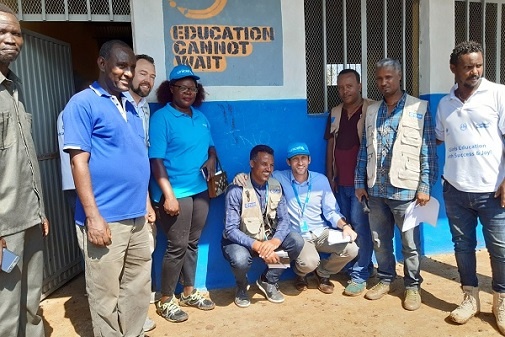
On 29 November 2019, a total of 84 classrooms built through funding from Education Cannot Wait in refugee camps are being inaugurated by the Gambella Regional Government and UNICEF. The classrooms were constructed in Nguenyyiel, Terkidi, Kule, and Jewi refugee camps and will enable 8,500 refugee children, 38 per cent of them girls, to receive quality education on a double shift basis.
The classrooms have been constructed as part of a US $15 million two-year investment from Education Cannot Wait aimed at expanding education opportunities for children affected by emergencies and protracted humanitarian crisis in refugee camps and host communities in Gambella and Benishangul-Gumuz regions.
In addition to these classrooms, Education Cannot Wait is supporting the construction of three new inclusive model secondary schools and 41 classrooms in eight secondary schools to benefit 3,600 children from refugee camps and the surrounding host communities in the two regions. The schools will be fully fitted with water, toilets, and furniture.
Since April 2017, Education Cannot Wait’s investment has surpassed its targets and reached over 138,000 children in refugee and host communities in the two regions. The support has included training of 683 teachers at certificate and diploma level, distribution of 500 education and recreation kits and provision of school grants to improve education quality, training refugee and host community teachers in child-centered teaching methods and conducting accelerated school readiness classes for over 12,000 out-of-school children aged between six and seven years.
Partners in the school construction project include the Ministry of Education, Regional Education Bureaus, the Agency for Refugee and Returnee Affairs, UNHCR, UNICEF, Plan International and the United Nations High Commission for Refugees.
About Education Cannot Wait (ECW)
Education Cannot Wait (ECW) is the first global fund dedicated to education in emergencies and protracted crises. ECW was established during the World Humanitarian Summit in 2016 by international humanitarian and development aid actors, along with public and private donors, to help reposition education as a priority on the humanitarian agenda, usher in a more collaborative approach among actors on the ground and foster additional funding to ensure that every crisis-affected child and young person is in school and learning.
Source: Education Cannot Wait
